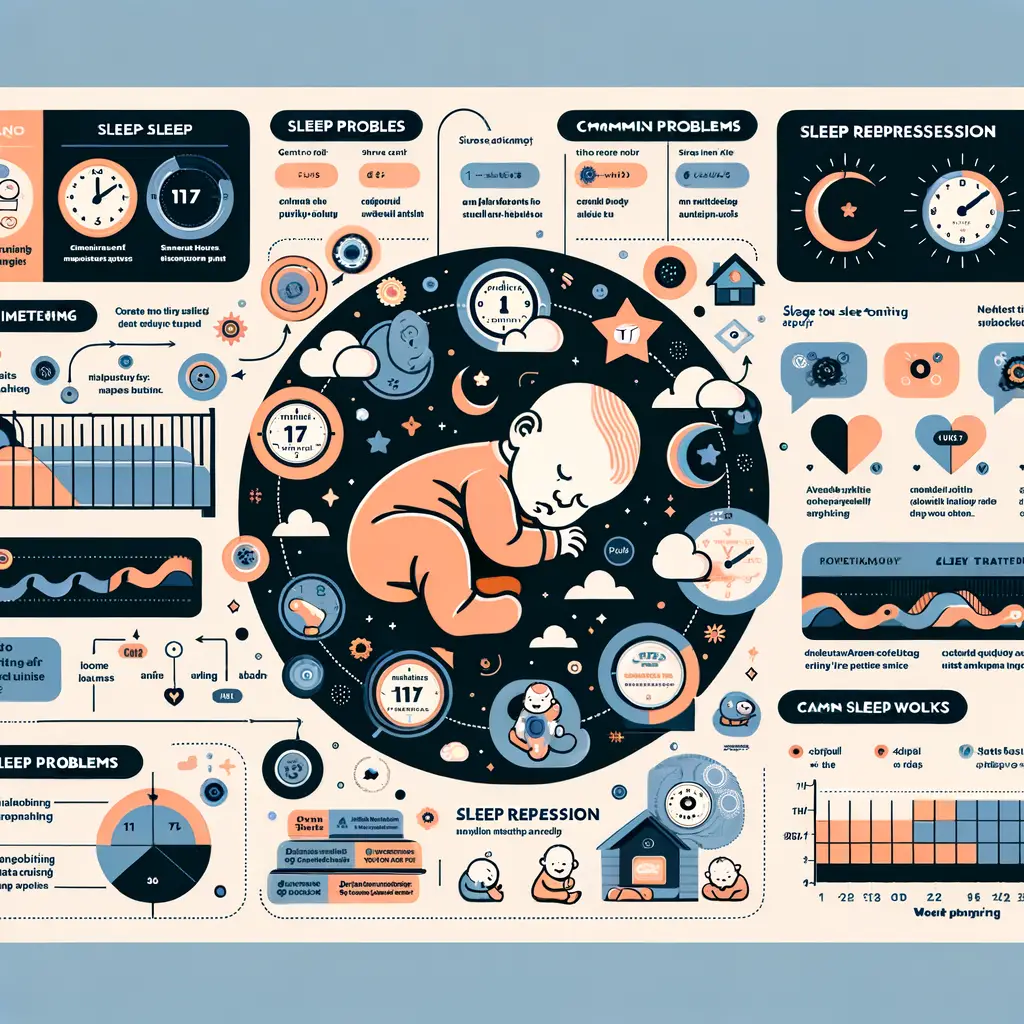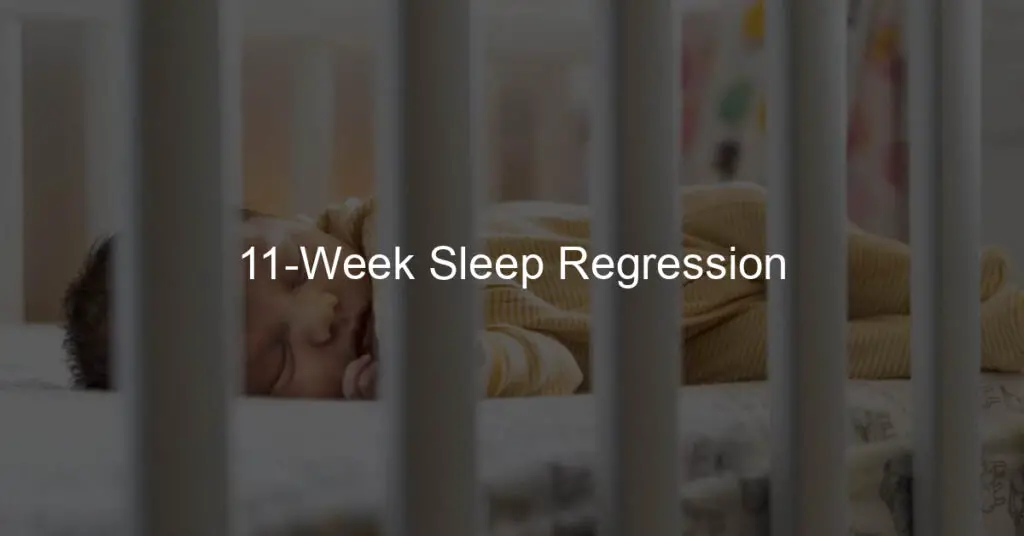Introduction to Baby Sleep Regression
As a new parent, you may have heard the term ‘baby sleep regression’ and wondered what it means. This article aims to provide a clear and comprehensive understanding of this common phase in a baby’s sleep cycle. We will explore what baby sleep regression is, its common causes, and how to identify its signs.
Understanding the concept of baby sleep regression
Baby sleep regression refers to a period when a baby who has been sleeping well suddenly starts waking up frequently at night or has trouble napping. It’s a completely normal part of a baby’s development and is often linked to growth spurts and the learning of new skills. However, it can be a challenging time for parents as it disrupts sleep routines.
Common causes of sleep regression in infants
There are several reasons why sleep regression may occur in infants. Some of the most common causes include teething, illness, changes in routine, and developmental milestones. For example, when babies learn to roll over or crawl, they often wake up more at night. It’s important to remember that each baby is unique and may experience sleep regression for different reasons.
Identifying signs of sleep regression
Identifying the signs of sleep regression can help you better manage this phase. Common signs include increased fussiness, changes in appetite, more frequent night wakings, and shorter naps. If your baby is showing these signs, it could be an indication of sleep regression. However, it’s always a good idea to consult with a healthcare professional to rule out any potential health issues.
In the following sections, we will delve deeper into the topic of 11-week sleep regression, common sleep problems at this age, and effective sleep training methods. We will also share some real-life case studies to provide practical insights on dealing with this challenging phase. Stay tuned!
Understanding 11-Week Sleep Regression

As parents, it’s important to understand the various stages of your baby’s development. One such stage is the 11-week sleep regression. This is a period when your baby’s sleep pattern may change, often causing distress to both the baby and parents. Let’s delve deeper into what this means, why it happens, and how to identify it.
What is the 11-week old sleep regression?
The 11-week sleep regression is a period when your previously well-sleeping baby might start having trouble falling asleep or staying asleep. This is a normal part of a baby’s development and is often linked to growth spurts and the development of new skills. It’s important to remember that every baby is unique and may not experience sleep regression at the same time or in the same way.
Why does the 11-week sleep regression occur?
The 11-week sleep regression often occurs due to a surge in your baby’s mental and physical development. This is a time when your baby is starting to become more aware of their surroundings and is learning new skills. These changes can disrupt their sleep as their brain is busy processing all the new information. Additionally, growth spurts can also cause increased hunger, leading to more frequent wake-ups.
Signs your baby is going through the 11-week sleep regression
There are several signs that your baby might be going through the 11-week sleep regression. These include more frequent night waking, difficulty falling asleep, shorter naps, or increased fussiness around sleep times. It’s important to note that these signs can also be indicative of other issues like teething or illness, so it’s always a good idea to consult with a healthcare professional if you’re concerned.
Understanding the 11-week sleep regression can help you better navigate this challenging period and provide the best care for your baby. Remember, this phase is temporary and with patience and understanding, both you and your baby will get through it.
11-Week Old Sleep Problems
When your baby reaches the 11-week mark, you may notice some changes in their sleep patterns. This can be a challenging time for both parents and baby, as sleep issues can start to emerge. Let’s delve into some of the common sleep problems that you may encounter during this period.
Common Sleep Issues
Understanding what is happening with your baby’s sleep at this stage can help you navigate through this challenging period. Here are some common sleep issues that you might encounter:
Understanding the baby sleep cycle changes
At around 11 weeks, your baby’s sleep cycle begins to mature. Unlike adults, babies spend more time in REM (Rapid Eye Movement) sleep, which is a lighter stage of sleep. This means they may wake up more often. It’s important to understand this change so you can adjust your expectations and manage your baby’s sleep better.
Identifying the common baby sleep issues at 11 weeks
Some common sleep issues at this age include difficulty falling asleep, frequent night wakings, and short naps. Your baby might also start to fight sleep, which can be a sign of overstimulation or overtiredness. Recognizing these issues is the first step towards finding a solution.
Remember, every baby is unique and may experience different sleep issues. It’s important to observe your baby’s sleep patterns and consult with a pediatrician if you have any concerns.
Solutions to Sleep Regression
Sleep regression can be a challenging phase for both parents and babies. But don’t worry, there are practical solutions to help you navigate this period. Here are some tips and tested methods to deal with sleep regression.
Dealing with sleep regression: Practical tips and advice
Understanding your baby’s sleep patterns is the first step in dealing with sleep regression. Here are some practical tips:
Establish a consistent bedtime routine. This can help signal to your baby that it’s time to sleep.
Ensure your baby’s room is conducive for sleep. It should be dark, quiet, and at a comfortable temperature.
Try not to rush in at the first sound of your baby waking. Give them a chance to self-soothe and fall back asleep on their own.
Remember, it’s okay to ask for help. If you’re feeling overwhelmed, reach out to a healthcare professional or a trusted family member or friend.
Sleep regression solutions: Tried and tested methods
Here are some tried and tested methods that have helped many parents deal with sleep regression:
Sleep training: This involves teaching your baby to soothe themselves to sleep. There are various methods of sleep training, such as the “cry it out” method, the “no tears” method, and the “fading” method. Choose a method that you feel comfortable with and that suits your baby’s temperament.
Adjusting nap times: If your baby is having trouble sleeping at night, it might be because they’re napping too much or too little during the day. Try adjusting their nap times and see if it makes a difference.
Feeding before bedtime: A full tummy can help your baby sleep better. Try feeding them right before bedtime.
Remember, every baby is unique and what works for one might not work for another. It’s all about trial and error and finding what works best for your baby. And most importantly, remember that this phase is temporary and will pass.
Infant Sleep Patterns

Understanding the sleep patterns of infants can be a challenging task for new parents. However, with the right knowledge and guidance, it can become much easier. In this section, we will delve into the evolution of infant sleep patterns and what you can expect from your 11-week old’s sleep schedule.
Understanding Infant Sleep Patterns
Infant sleep patterns are unique and different from those of adults. They evolve rapidly during the first year of life, reflecting the rapid development of the infant’s brain and nervous system.
How infant sleep patterns evolve
During the first few weeks of life, infants sleep for most of the day, with no clear distinction between day and night. This is because their internal clock, or circadian rhythm, is not yet fully developed. As they grow, their sleep patterns start to become more like those of adults. By the age of 6 months, most infants have a fairly regular sleep-wake cycle and sleep more during the night than the day. However, they still need several naps during the day.
What to expect from your 11-week old’s sleep schedule
At 11 weeks, your baby is likely to sleep for about 14-17 hours in a 24-hour period. They may have two to four long sleep periods and several shorter periods of wakefulness. At this age, most babies are not yet able to sleep through the night without feeding, but they may start to have longer periods of sleep at night. It’s important to remember that every baby is unique and there can be a lot of variation in sleep patterns.
Understanding your baby’s sleep patterns can help you anticipate their needs and establish a routine that works for both of you. Remember, if you have any concerns about your baby’s sleep, it’s always a good idea to consult with a healthcare professional.
Changes in Sleep Patterns
Understanding the changes in your baby’s sleep cycle
As your baby grows, their sleep patterns will naturally change. During the first few weeks, your baby may sleep for short periods throughout the day and night. This is because newborns have not yet developed a circadian rhythm, the internal clock that tells us when it’s time to sleep or wake up. However, by the time your baby reaches 11 weeks, they may start to sleep for longer periods at night and stay awake for longer periods during the day.
It’s also common for babies to experience sleep regressions, which are periods when a baby who has been sleeping well suddenly starts waking up more often or has difficulty falling asleep. Sleep regressions often occur because of growth spurts, developmental milestones, or changes in the baby’s environment. The 11-week mark is one such time when a sleep regression might occur.
How to adapt to your baby’s changing sleep patterns
Adapting to your baby’s changing sleep patterns can be a challenge, but there are strategies that can help. One of the most important things you can do is to establish a consistent bedtime routine. This can help signal to your baby that it’s time to sleep. Your routine might include activities like a bath, a book, and a lullaby before bed.
It’s also helpful to pay attention to your baby’s sleep cues. If your baby is rubbing their eyes, yawning, or becoming fussy, it may be time for a nap. Trying to keep your baby awake when they’re tired can actually make it harder for them to fall asleep.
Finally, remember that every baby is different. What works for one baby might not work for another. It’s important to be patient and flexible as you figure out what works best for your baby’s sleep patterns.
Sleep Training Methods
As a parent, you might have heard about sleep training. But what exactly is it? And how can it help your baby sleep better? In this section, we’ll delve into the world of sleep training, exploring various methods and their pros and cons.
Introduction to Sleep Training
Sleep training is a process that helps babies learn to fall asleep on their own and stay asleep throughout the night. It’s a crucial part of their development and can help establish healthy sleep habits that last a lifetime. According to the American Academy of Pediatrics, sleep training can begin when a baby is between 4 to 6 months old, when they naturally start to develop a regular sleep-wake cycle.
Various Sleep Training Methods to Consider
There are several sleep training methods you can consider. Here are a few:
The Ferber Method: This involves letting your baby cry for a predetermined amount of time before offering comfort.
The Chair Method: You sit in a chair next to your baby’s crib until they fall asleep, gradually moving the chair further away over time.
The Fading Method: You gradually reduce your involvement in your baby’s sleep routine, allowing them to become more independent.
Pros and Cons of Different Sleep Training Methods
Each sleep training method has its pros and cons. Let’s take a look:
| Method | Pros | Cons |
|---|---|---|
| The Ferber Method | Can be effective in a short amount of time. | Can be stressful for the baby and parents. |
| The Chair Method | Provides comfort to the baby while encouraging independence. | Can be time-consuming. |
| The Fading Method | Gradual approach can be less stressful for the baby. | May take longer to see results. |
Remember, every baby is unique, and what works for one might not work for another. It’s essential to choose a method that feels right for you and your baby. And always consult with your pediatrician before starting any sleep training program.
Case Studies: Dealing with 11-Week Sleep Regression
Let’s delve into some real-life experiences of parents who have successfully navigated the 11-week sleep regression. These case studies will provide practical insights and strategies that can help you manage this challenging phase.
Case Study 1: A Successful Approach to Handling Sleep Regression
Meet Sarah, a first-time mom who found herself struggling with her baby’s sleep regression at 11 weeks. She noticed her baby was waking up more frequently at night and refusing to go back to sleep. Sarah decided to implement a consistent bedtime routine, which included a warm bath, a bedtime story, and a lullaby. She also ensured her baby’s room was dark, quiet, and at a comfortable temperature. Within a week, her baby started showing signs of improvement. This case study highlights the importance of consistency and creating a conducive sleep environment.
Case Study 2: Overcoming Challenges in Sleep Training
Next, we have John and Lisa, parents of twins. They faced double the challenge when both their babies hit the 11-week sleep regression simultaneously. They decided to try sleep training, specifically the ‘cry it out’ method. It was tough at first, but they remained patient and persistent. After a few nights, their twins began to self-soothe and sleep for longer periods. This case study demonstrates that while sleep training can be challenging, it can also be effective with patience and perseverance.
Case Study 3: Navigating Through the 11-Week Sleep Regression
Finally, we have Emma, a single mother who was already juggling a lot when her baby entered the 11-week sleep regression. She decided to seek professional help and consulted a sleep consultant. The consultant provided a customized sleep plan, which Emma followed diligently. Her baby’s sleep improved significantly within two weeks. This case study shows that seeking professional help can be a beneficial strategy for dealing with sleep regression.
These case studies serve as a reminder that every baby and situation is unique. What works for one may not work for another. The key is to remain patient, consistent, and open to trying different strategies until you find what works best for your baby.
Conclusion: Surviving the 11-Week Sleep Regression
As we wrap up this comprehensive guide on the 11-week sleep regression, it’s crucial to remember that every baby is unique. Their sleep patterns will vary, and so will their responses to different sleep training methods. However, with patience, consistency, and the right approach, you can help your baby navigate this challenging phase.
Key takeaways for dealing with the 11-week sleep regression
Firstly, understanding the 11-week sleep regression is key. It’s a phase where your baby’s sleep pattern changes, often leading to more frequent wake-ups. It’s a natural part of their development and not a sign of any problem.
Secondly, it’s essential to maintain a consistent sleep schedule and create a soothing bedtime routine. This can help signal to your baby that it’s time to sleep.
Lastly, while it can be a challenging time, remember that this phase is temporary. With time, your baby will return to their regular sleep patterns. In the meantime, ensure you’re taking care of yourself too. Reach out for support if needed, and remember, you’re doing a great job.
Final thoughts on managing baby sleep issues
Managing baby sleep issues can be a test of patience and endurance. However, understanding that these are common experiences for many parents can provide some comfort. It’s important to remember that these sleep regressions are just phases in your baby’s development. They will pass.
Stay patient, consistent, and flexible in your approach. And most importantly, don’t hesitate to seek professional help if you’re feeling overwhelmed. Pediatricians and child sleep consultants can provide valuable advice and support during these challenging times.
In conclusion, surviving the 11-week sleep regression is all about understanding, patience, and consistency. Remember, this too shall pass. Happy parenting!














